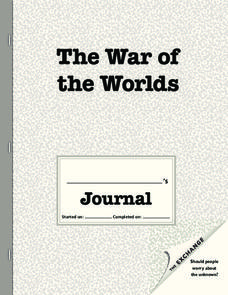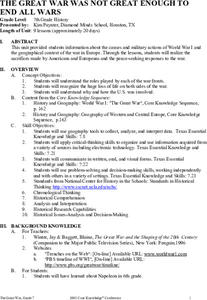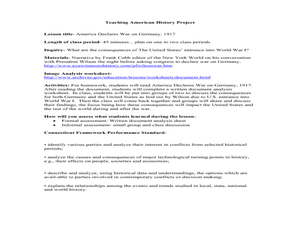University of California
Decolonization
The ripple effect from one small event can impact many others. Young historians research the ripple effect World War II had on decolonization in the second installment of an eight-part series. Through primary and secondary documents as...
Curated OER
Cold War Roots and Events
Ninth graders examine the causes and major events of the Cold War. They listen to a lecture and fill in the blanks on a handout, and in two groups develop a proposal to deal with the Cuban Missile Crisis.
Curated OER
Perceptions of War
Tenth graders share perspectives on war with Iraq with students from various countries, and write position papers expressing specific stance on issues.
Curated OER
The War of the Worlds
Read The War of the Worlds with your class. Then you can enhance the reading experience through the use of these worksheets. Keeping track of reading, recording reader response, and various activities pertaining to the book are included....
National Endowment for the Humanities
People and Places in the North and South
North and South: two opposite directions and two opposite economic and social systems in time of the Civil War. Pupils peruse census websites and primary source photographs to understand what life was like for the everyday person before...
Curated OER
Images at War
Students examine American attitudes toward war as revealed in Civil War photographs and WWII homefront posters. They analyze and discuss photos, explore the National Archives website, and organize a statement of their findings.
Curated OER
Main Causes of World War Two
In this causes of World War II study guide learning exercise, learners discover details regarding this time period in world history. Students read 13 sections of information and examine photographs.
Curated OER
The Cause and Course of the Great War
Students interpret historical evidence presented in primary and secondary resources. In this World War I lesson plan, students research the causes of the war as well as the major events of the war. Students are...
Curated OER
Computer Lab Worksheet Background and Causes of WWI
In this research skills worksheet, students use the noted Web sites to locate responses to 6 short answer questions about World War I. Students also research the specific reasons that selected countries joined World War I.
Curated OER
The Great War Was Not Great Enough To End All Wars
Students examine the causes and military actions of World War I. In this World History lesson, students study the sacrifices made by Americans and Europeans. Students read and analyze primary sources related to World War I.
Curated OER
What Did You Do After the War, Grandpa?
Students consider how World War II impacted Europe and European soldiers. In this Victory in Europe lesson, students visit selected websites to discover information about the war, its conditions, and the celebration that ensued at the...
Curated OER
America Declares War on Germany, 1917
Students explore the reasons that the United States entered World War I. In this World War I lesson, students read "America Declares War on Germany, 1917," and then discuss the consequences for the U.S. entering the war.
Curated OER
What is to Become of the World After the War?
Students analyze primary sources regarding World War II. In this World War II lesson, students read "The Atlantic Charter," and respond to questions about the document.
Curated OER
America's Economy: Sorrow And Hope
Students discover how Americans found the hope that broke the Great Depression. In this American economics lesson, students watch "America's Economy: Sorrow and Hope." Students then discuss the implications of the depression and...
Curated OER
Atomic Bomb Debate
Students research the decision to end World War II by dropping the atomic bomb. For this world history lesson, students explore information on the atomic bomb and the decision of the tactics to use it. They also watch a video and plan...
Curated OER
The Political Dr. Seuss
High schoolers discuss the role political cartoons have played in U.S. politics and public affairs since the 1700's. They analyze some of the political cartoons Dr. Seuss drew during World War II and discuss how these cartoons conveyed...
Curated OER
IMADUNCE (Causes of WWI) Comprehension
In this causes of World War I worksheet, learners respond to 6 short answer questions regarding what caused the war and that feature the letters of the word "imadunce" as mnemonic hooks.
Curated OER
Why Empire? Why War?
Tenth graders examine the purpose of territorial expansion. In this World History lesson, 10th graders analyze various articles on World War II. Students prepare arguments for and against territorial expansion.
Curated OER
Introduction to the Early Origins of the Cold War
In this Cold War worksheet, students read a 4-paragraph selection about post World War II diplomacy and then list key dates and events noted in the selection.
Curated OER
My Secret War: Lesson 14
Fifth graders explore the civilian role during World War II. In this social studies lesson, 5th graders write an "I Am an American" poem from the perspective of various Americans during the war.
Curated OER
Causes of World War I
Ninth graders identify and explain the six major causes of World War I. They explore the events leading up to WWI, the assassination of Franz Ferdinand and why they were the culmination of everything. Students discuss the...
Curated OER
5th Grade Social Studies
In this social studies worksheet, 5th graders complete multiple choice questions about immigrants, World War II, the Civil War, prosperity, and more. Students complete 25 questions.
Curated OER
Treaty of Versailles
Students describe the purposes of the Treaty of Versailles. In groups, they analyze the causes and effects of the treaty and discuss why the Americans were so against it. They note ideas for and against its ratification and they make...
Curated OER
An Untold Triumph
Middle schoolers examine and analyze the history and experience of Filipinos in Hawaii and California. They identify the contributions of Filipino Americans to the US war effort in World War II, and analyze the many causes that led to...

























